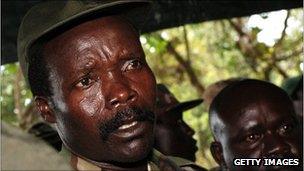Kony2012 screenings 'abandoned in northern Uganda'
- Published

LRA rebel leader Joseph Kony is wanted by the International Criminal Court
A group showing a film urging the capture of Ugandan rebel leader Joseph Kony has cancelled further public viewings in northern Uganda.
The half-hour film Invisible Children made by US-based campaigners has gone viral since its release last week.
But the first public screening in Lira provoked outrage when it was shown to thousands of people in the town.
Many in the audience had experience of Mr Kony's Lord's Resistance Army, and felt it was insensitive.
The LRA has been notorious for kidnapping children, forcing the boys to become fighters and using girls as sex slaves.
<link> <caption>The film, Kony2012</caption> <url href="http://www.youtube.com/watch?v=Y4MnpzG5Sqc" platform="highweb"/> </link> , has had more than 78m hits on YouTube over the last week.
'Celebrating suffering'
The African Youth Initiative Network (AYINET) wanted to allow the people worst affected by the LRA and who do not have internet access to see what millions of people around the world have been talking about.
Correspondents say many of the crowd in Lira left early on Tuesday and some threw stones.
But the organisers said the result was a mixture of anger and incomprehension especially about the campaign's strategy to "make Kony famous".
"People kept on getting upset," said Victor Ochen of AYINET.
"They were wondering: 'If this is about northern Uganda, how come it's dominated by non-Ugandans? What is it about now? This is an insult,'" he said.
"And they were saying [that] whoever did this movie was celebrating their suffering."
Mr Kony and his close aides have been wanted by the ICC in The Hague since 2005.
Their campaign of terror began in northern Uganda more than 20 years ago when they said they were fighting for a biblical state and the rights of the Acholi people.
The LRA is listed by the US as a terrorist organisation and now operates mainly in neighbouring countries.
Mr Kony refused to sign a peace deal with the Ugandan government in 2008 when it could not guarantee the withdrawal of the ICC arrest warrants.